Do Betta Fish Need A Filter?
One of the main questions we get is “Do betta fish need a filter in their tank?”.
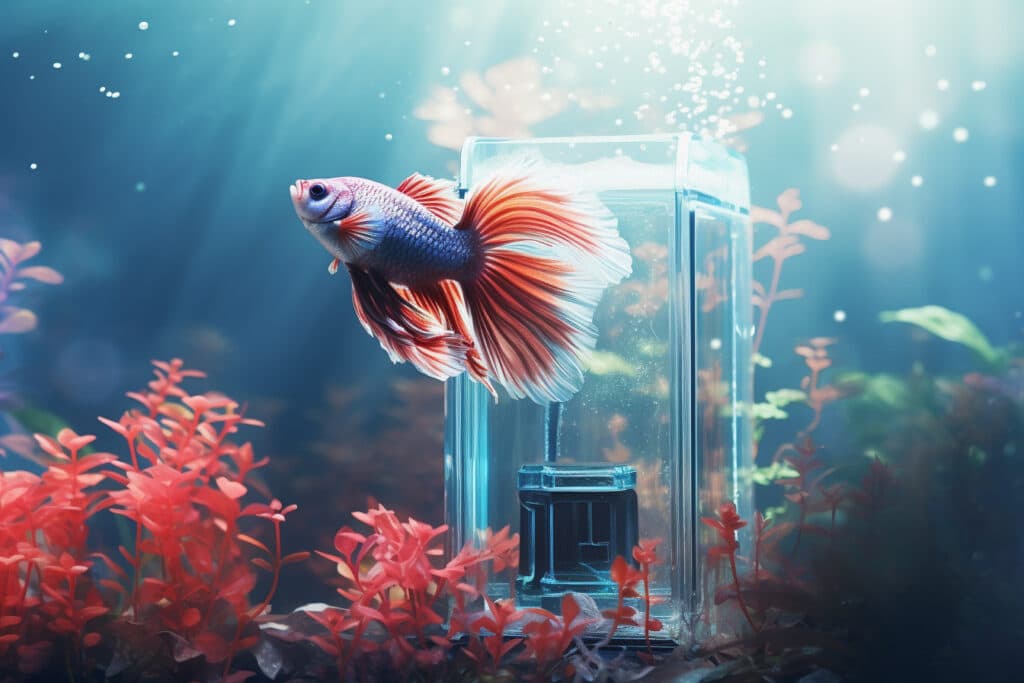
Betta fish, also known as Siamese fighting fish, is a tropical fish, commonly found in shallow freshwater environments, such as rice paddies, streams, and slow-moving waters, they are native to Southeast Asia, particularly Thailand, Cambodia, and Vietnam.
In the wild, the betta fish possesses an incredible adaptation known as the labyrinth organ. This unique organ allows them to breathe air from the surface in addition to extracting oxygen from the water, granting them the ability to survive in oxygen-deprived environments.
As a responsible betta owner, providing them with a suitable and healthy environment is essential.
In this blog post, we will delve into the importance of filtration for betta fish tanks and explore the benefits it provides to ensure the well-being of these captivating aquatic companions.
Table of Contents 🦑
So, Do Betta Fish Need A Filter for Real?
While it is possible to keep a betta fish in a tank without a filter, having a filter is highly recommended for several reasons
Picture this: your Betta fish, gracefully navigating through their aquatic world, surrounded by clear and pristine water. The secret behind this underwater paradise? The unsung hero of aquariums—the filter! While Betta fish are known for their resilience, a properly chosen filter can transform their tank into a haven of well-being.
Filters play a crucial role in maintaining water quality by removing fish waste, toxins, and harmful substances that can accumulate in the tank. They also aid in oxygenation and aquarium water circulation, creating a more natural and comfortable environment for betta fish.
Without a filter, especially in an aquarium populated with tank mates the water in the tank can quickly become stagnant, leading to poor water quality and an increased risk of ammonia and nitrite buildup. This can stress and compromise the health of betta fish, making them more susceptible to diseases.
A filter helps to establish a beneficial nitrogen cycle in the tank, converting toxic ammonia into less harmful substances through biological filtration. It also provides aeration, ensuring an adequate oxygen supply for the fish.
An aquarium filter helps to control and reduce algae growth in the tank. Algae thrive in stagnant water with excess nutrients, and a filter helps to prevent the buildup of these nutrients by constantly circulating the water. This helps to keep the tank clean and free from unsightly algae blooms, providing a more visually appealing and enjoyable habitat for your betta fish.
Overall, while it is possible to maintain a betta fish tank without a filter, it requires diligent and frequent water changes to maintain water quality. However, a properly sized and functioning filter is highly recommended to provide a stable and healthy environment for betta fish, promoting their overall well-being and longevity.
So, do betta fish need a filter? Absolutely YES!, because it’s the secret to a thriving aquatic kingdom, where your Betta reigns supreme in health and happiness.
Overall, a filter plays a crucial role in maintaining optimal water conditions, reducing the frequency of water changes, and promoting the long-term health and well-being of your betta fish.
10 Reasons To Use A Filter In Your Betta Fish Tank
filter for your betta fish is an investment that can greatly benefit your aquatic companion and the overall health of your tank. A fish tank filter serves several essential purposes:
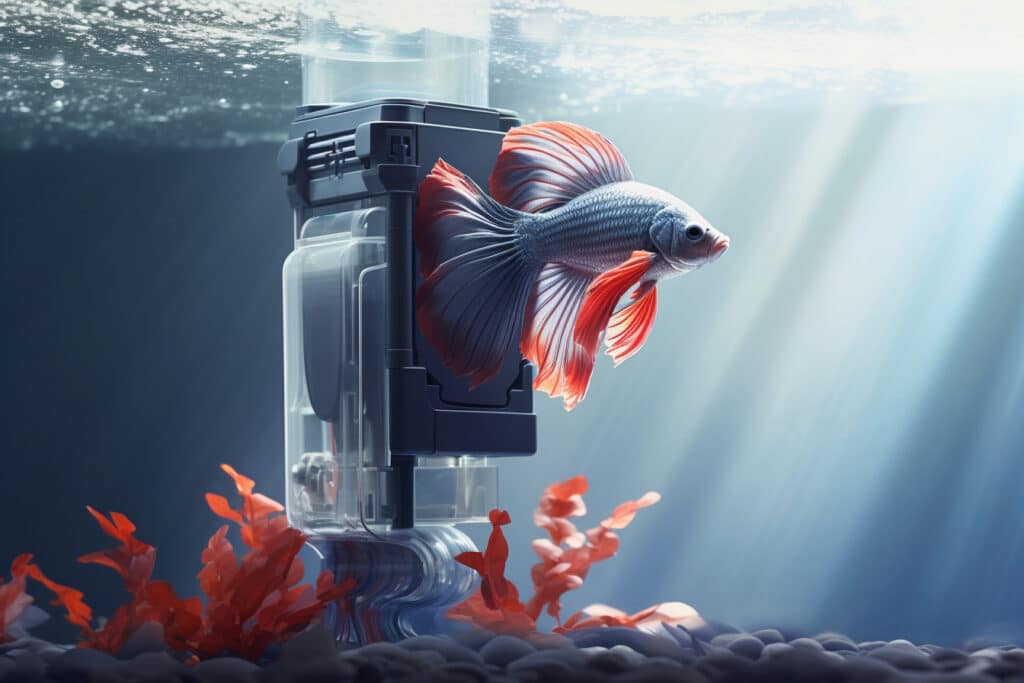
Crystal Clear Waters
A filter’s main gig is to keep your Betta’s home sparkling clean. Say goodbye to the days of murky waters and hello to a crystal-clear underwater paradise where your fish can flaunt their vibrant colors.
Ammonia Assassin
Filters are like the ultimate superheroes, battling against the evil ammonia that can build up in your tank. With a filter in place, your Betta won’t have to worry about toxic substances messing with their fishy well-being.
Oxygen Oasis
Just like you need air, your Betta needs oxygen too. Filters create water movement that ensures a constant exchange of oxygen, helping your fish breathe easy and swim happily.
Beneficial Bacteria Banisher
Beneficial bacteria find filters irresistible. These microscopic superheroes help break down harmful waste, transforming it into less harmful substances. Your Betta will be thankful for their tank’s built-in waste disposal system.
Lazy Days for You
Filters minimize the frequency of water changes. So, kick back, relax, and let the filter do some of the hard work. Just remember, even though you can chill, your Betta might still want to show off their fin flares.
Stress Reliever
Clean aquarium water equals a stress-free Betta. A filter maintains stable water conditions, reducing stress and boosting your fish’s overall health. Imagine if someone cleaned your room every day—how awesome would that be?
Food Debris Disposal
Aquarium filters gobble up leftover food, saving your Betta from swimming in a sea of leftovers. No more scavenger hunts for uneaten bits, and your finned friend gets to enjoy a clean dining experience.
Current Creations
Betta fish originate from areas with gentle currents. Aquarium filters replicate these currents, making your fish feel at home and giving them an environment that aligns with their natural instincts.
Goodbye Nitrites
Aquarium filters also tackle nitrites, which can be harmful to your Betta’s health. These sneaky compounds are broken down by the filter’s bacterial allies, keeping your fish safe from potential troubles.
Healthy Habitats
Ultimately, an aquarium filter is like the guardian angel of your Betta’s home. By maintaining optimal water conditions, it ensures your fish lives in the lap of luxury—a habitat that’s perfect for flourishing, fin-tastic adventures.
7 Different Types of Betta Filters
Discover the key to the happiness of your pet betta – The Perfect Filter!
Just like us, bettas need a clean and comfortable home to thrive. A reliable and efficient filter is an essential tool to maintain water quality and provide a healthy environment for your finned friend.
Let’s check all the various filter options available, helping you find the ideal match for your betta’s needs. From gentle flow to effective filtration, get ready to uncover the secrets of selecting the perfect filter for your beloved betta fish. Let’s dive in and ensure your betta enjoys the cleanest, freshest, and most vibrant aquatic haven imaginable!
Sponge Filters
Sponge filters provide gentle filtration suitable for bettas. They offer biological filtration by hosting beneficial bacteria, which helps maintain a healthy tank environment. Sponge filter is safe for baby bettas and shrimp and are easy to set up and maintain.
Gentle filtration is suitable for bettas.
Provides biological filtration.
Safe for baby bettas and shrimp.
Easy to set up and maintain.
Affordable and energy-efficient.
Hang-on-Back Filters (HOB)
Hang-on-Back (HOB) Filters: HOB filters are easy to install and maintain. They provide efficient mechanical and chemical filtration, keeping the water clean and clear. The adjustable flow rate allows you to customize the water flow for your betta fish’s needs.
Easy to install and maintain.
Provides efficient mechanical and chemical filtration.
Adjustable flow rate.
Suitable for medium to large-sized bettas tank.
Internal Filters
Internal filters are compact and easy to install. They offer mechanical and biological filtration and are suitable for small to medium-sized tanks. Internal filters provide an adjustable flow rate, allowing you to customize the water flow.
Compact and easy to install.
Offers mechanical and biological filtration.
Suitable for small to medium-sized betta tanks.
Provides adjustable flow rate.
Canister Filters
Canister filters offer excellent mechanical, biological, and chemical filtration. They are suitable for larger tanks and provide a strong water flow and high filtration capacity. Canister filters can be customized with different filter media to cater to specific filtration needs.
Offers excellent mechanical, biological, and chemical filtration.
Suitable for larger tanks.
Provides a strong flow for the water and high filtration capacity.
Can be customized with different filter media.
Under Gravel Filters
Under gravel filters provide biological and mechanical filtration by utilizing the gravel bed as a filter media. They require an air pump for operation and help maintain a clean gravel bed. Undergravel filters are suitable for tanks with a low fish load.
Provides biological and mechanical filtration.
Requires an air pump for operation.
Helps maintain a clean gravel bed.
Suitable for tanks with low fish load.
Internal Power Filters
Internal power filters provide mechanical and biological filtration. They are fully submersible in the tank and offer an adjustable flow rate. Internal power filters are easy to install and maintain.
Provides mechanical and biological filtration.
Adjustable flow rate.
Can be fully submerged in the tank.
Easy to install and maintain.
UV Sterilizers
UV sterilizers provide sterilization of the aquarium water by eliminating harmful bacteria, viruses, and parasites. They also help control algae growth. UV sterilizers enhance water clarity and quality and can be used in combination with other filter media types.
Provides sterilization of water, eliminating harmful bacteria, viruses, and parasites.
Helps control algae growth.
Enhances tank water clarity and quality.
It can be used in combination with other filters.
So Which Are The Bets Filter Types For Betta Fish Tank
Discovering the ideal filtration system for your Betta fish tank is a vital step towards creating a thriving aquatic haven.
You want your Betta to flourish in an environment that balances cleanliness and tranquility, and that’s where the magic of filtration comes in.
In this quest for the perfect filter media, we unveil the top three contenders: Sponge Filters, HOB (Hang-On-Back) Filters, and Internal Filters. These exceptional filter types have been carefully chosen to ensure your Betta’s well-being remains at the forefront.
Check the list below with the intention of finding not just a filter, but a partner in maintaining your Betta’s world, so you can witness the vibrancy of your aquatic friend thrive like never before.
#1. Sponge Filters: Sponge filters are gentle and perfect for Betta fish due to their low water flow and soft filtration. Betta fish have delicate fins that can be easily disturbed by strong currents, making sponge filters an excellent choice. They provide a safe environment for Betta fish to swim without the risk of getting their fins torn.
#2. HOB (Hang-On-Back) Filters: HOB filters are among the best choices for Betta fish because they offer adjustable flow rates. Betta fish prefer calm waters, and with HOB filters, you can control the water movement to prevent stressing your Betta. Their efficient filtration stages also ensure water clarity and quality.
#3. Internal Filters: Internal filters are well-suited for Betta fish tanks because they provide comprehensive filtration in a compact design. These filters offer mechanical, chemical, and biological filtration, which is crucial for maintaining a healthy environment. Being placed inside the tank, they don’t create strong currents that can distress Betta fish.
Each of these filter media types caters to the specific needs and preferences of Betta fish, ensuring they have a clean and comfortable living environment.
9 Tips Before You Pick a New Filter
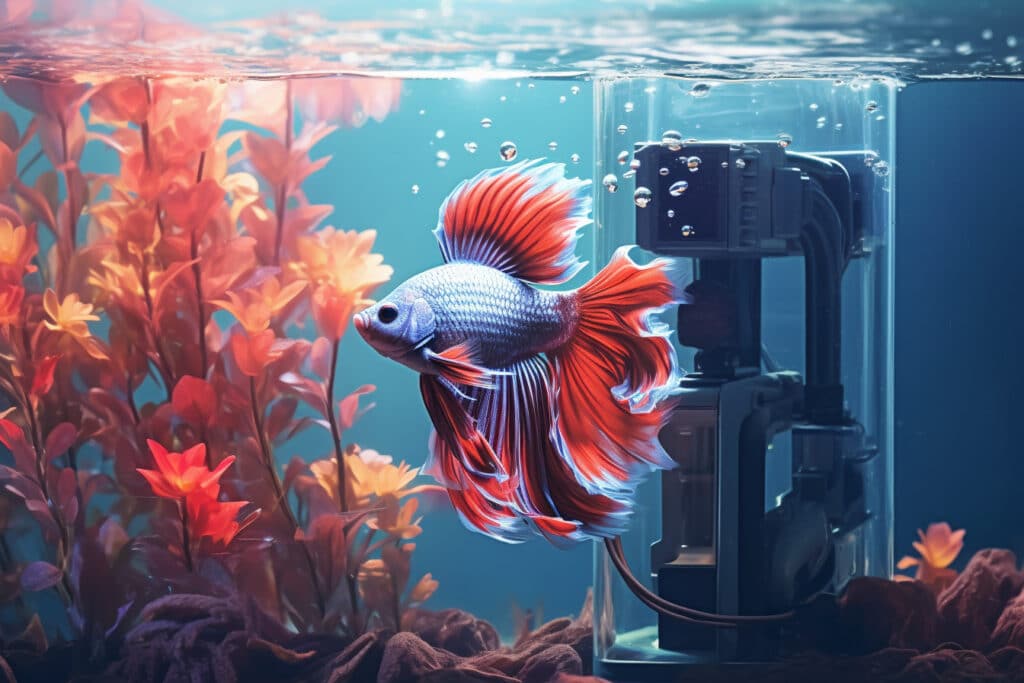
When it comes to choosing the right aquarium filter for your betta fish, there are several factors to consider. Here are some tips to help you pick the perfect filter:
Know Your Fish: Different fish species have different filtration needs. Research the specific requirements of your fish to determine the filtration capacity and flow rate that will suit them best.
Size and Flow: Bettas prefer gentle water flow, so look for a filter with adjustable flow settings or a low-flow filter specifically designed for bettas. The filter should be suitable for the size of your tank, providing adequate filtration without creating strong currents that can stress your betta.
Filtration Type: There are different types of filters available, such as sponge filters, hang-on-back (HOB) filters, or canister filters. Sponge filters are popular for bettas as they provide gentle filtration and are less likely to create strong currents.
Consider Tank Size: The size of your tank will determine the type and size of the filter you need. Larger tanks may require more powerful or multiple filters to ensure proper filtration.
Biological Filtration: Bettas benefit from biological filtration to maintain water quality. Look for a filter that provides sufficient surface area for beneficial bacteria to colonize and break down harmful toxins.
Adjustable Intake: To prevent your betta from getting caught in the filter, choose a filter with an adjustable intake or add a pre-filter sponge to cover the intake area.
Noise Level: Consider the noise level of the filter, especially if you have a small tank in a quiet environment. Look for filters with noise-reducing features or consider using a sponge filter, known for its quiet operation.
Ease of Maintenance: Opt for a filter that is easy to clean and maintain. Filters with easily replaceable filter media or cartridges are convenient and ensure optimal performance.
Brand Reputation: Choose filters from reputable brands known for their quality and reliability. Read reviews and seek recommendations from experienced aquarists to ensure you’re getting a reliable and durable filter.
Remember to always follow the manufacturer’s recommendations and properly install and maintain your chosen filter. Regular water testing and monitoring will help ensure a healthy and clean environment for your betta.
Consider the specific needs of your betta fish and your tank size when choosing the right filter. Factors such as water flow, filtration capacity, and ease of maintenance should also be taken into account.
Betta Tank Filters Possible Drawbacks
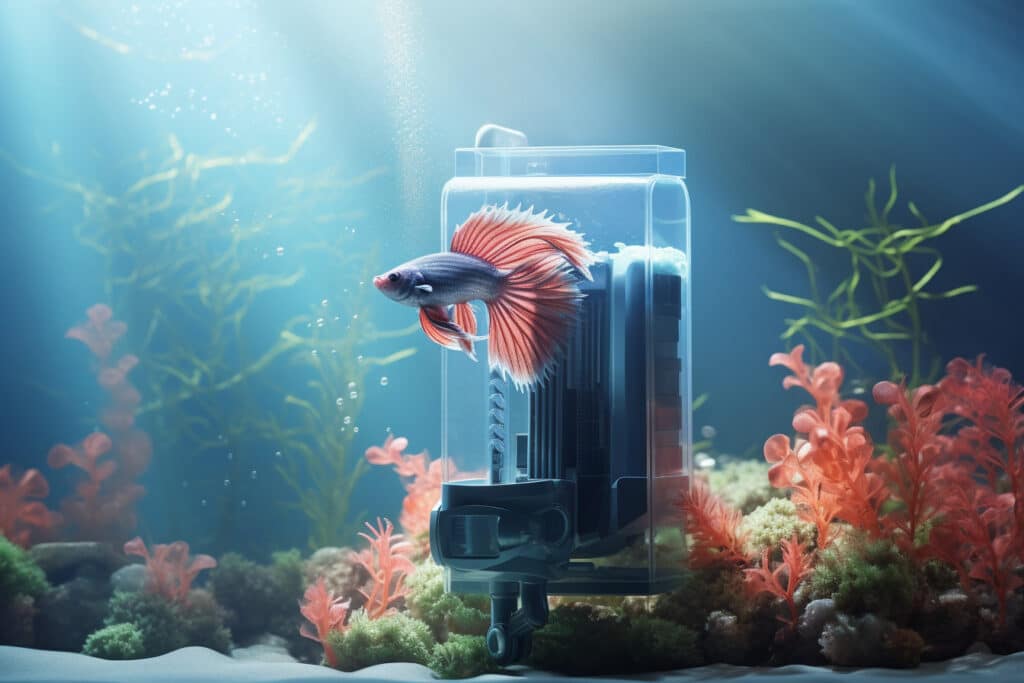
While using a filter in a Betta fish tank offers numerous benefits, there are a few potential drawbacks to consider:
Water Current: Filters can create water currents that might be too strong for Betta fish, especially those with long fins like Halfmoon or Crowntail Bettas. Strong currents can stress or exhaust your Betta, making it difficult for them to swim comfortably. To mitigate this, choose a filter media with adjustable flow or one that produces gentle currents.
Jumping Risk: Some Betta fish have a tendency to jump out of the water. Filters with an exposed intake or outflow can provide a jumping point for your Betta. To prevent this, consider using a filter guard or mesh to cover these areas.
Injury to Fins: Filters with strong outflows or intakes can potentially catch and damage the delicate fins of Betta fish. This is particularly concerning for Bettas with long, flowing fins. You can use pre-filters or sponge covers to minimize this risk.
Noise: Certain filters can generate noise, either from water splashing or the motor itself. Noise can stress your Betta, affecting their overall well-being. Opt for filters with quiet operation or consider adding baffles to reduce noise.
Aesthetic Disruption: Some filters may be visually intrusive in your tank, disrupting the aesthetics you’ve carefully curated. Internal filters or sponge filters are less obtrusive in this regard.
Maintenance: Filters require regular maintenance to function effectively. Neglecting maintenance can lead to reduced filtration and water quality issues. Cleaning the filter media and performing water changes are necessary tasks.
Despite these potential drawbacks, many of them can be mitigated with proper equipment choice and careful tank setup. With thoughtful consideration and adjustments, you can use a filter in your Betta fish tank without compromising your Betta’s well-being.
Frequently Asked Questions (FAQs) About Betta Fish Filters
Q: Can live plants replace the need for a filter in a betta tank?
A: While live plants can contribute to water quality by absorbing nitrates and providing oxygen, they alone may not be sufficient to handle the uneaten food and waste produced by bettas. A filter remains crucial for effective waste removal and water circulation.
Q: Are all filter types suitable for betta fish?
A: Not all filters are suitable for betta fish. Gentle filters like sponge filters, HOB filters with adjustable flow, and internal filters are better choices. Avoid strong currents that might stress your betta.
Q: Will a filter create too much current for my betta?
A: It depends on the type of filter and its flow control. Sponge filter, HOB filters with adjustable flow, and internal filters can be set to create a gentle current, which is ideal for bettas.
Q: Can air pump filter be used for betta tanks?
A: Air pump filters, like sponge filters, are suitable for betta tanks. They create gentle water movement and aeration, ensuring a healthy environment without causing stress to your betta.
Q: What about filter maintenance? Is it difficult?
A: Filter maintenance is crucial for its effectiveness. However, most filters are designed for easy maintenance. Regular cleaning and occasional media replacement will keep your filter functioning optimally.
Q: Can a filter replace water changes in a betta tank?
A: While a filter helps maintain water quality, regular water changes are still necessary to remove accumulated waste, uneaten food and prevent toxins from building up.
Q: Can I turn off the filter at night?
A: It’s not recommended to turn off the filter at night. Filters provide continuous water circulation and oxygenation, which are essential for your betta’s health. If the flow is too strong, consider using a filter with adjustable settings.
Q: How often should I clean the filter?
A: Filter maintenance frequency varies based on the filter type and tank conditions. In general, a monthly check and cleaning are recommended. However, monitor your tank regularly and clean the filter when you notice reduced water flow.
Q: Can I use a filter in a small betta tank?
A: Yes, you can use a filter in a small betta tank, but choose a filter with a low flow rate to prevent strong currents that might stress your betta.
Remember, each betta fish is unique, so consider your specific tank setup and your betta’s behavior when selecting and using a filter. If in doubt, opt for a gentle filter type and observe how your betta responds.
In Conclusion: Ensuring a Happy Betta with the Right Filter!
Congratulations, you’re now equipped with the fin-tastic knowledge of why betta fish deserve the best care possible – and that includes a top-notch aquarium filter!
Investing in a suitable filter media isn’t just a choice, it’s a commitment to your betta’s well-being.
A clean and well-maintained environment leads to a happier and healthier fish. Whether you opt for a gentle sponge filter, a versatile HOB filter, or a compact internal filter, your betta will thank you for the improved water quality and stress-free living.
So, dive in, explore the options, and make a wise choice for your finned friend. A thriving betta in a sparkling tank is worth every bubble of effort – trust us, your betta will swim with glee!
Thank you for exploring the depths of knowledge with us here at BettaReef.com! We’re thrilled to be your underwater tour guides, helping you navigate the exciting world of betta fish care.
Remember, every tail wag and bubble pop in your betta’s tank is a small underwater adventure.
We hope our tips and insights have been as refreshing as a cool stream on a sunny day. Feel free to splash around our site for more fin-tastic information.
Until our next aquatic rendezvous, keep those fins swimming and those smiles shimmering!

Delighted to have you here at BettaReef! This place is a treasure trove of knowledge about Betta fish, Betta Care, Health, Gear, and much more from the wonders of aquatic life. My journey in this fascinating world began when I was just 8, and now, as a seasoned hobbyist, I’m here to help fellow Betta enthusiasts create a thriving Betta environment for a healthy life.
I’m committed to delivering high-quality content, backed by a stringent editorial process. Each product review is based on real-life usage and practical analysis, ensuring that you get insights and advice that truly matter.
Related Blog Posts:

How To Clean A Betta Fish Tank The Best Way
How To Clean A Betta Fish Tank The Best Way Welcome to our Blog post
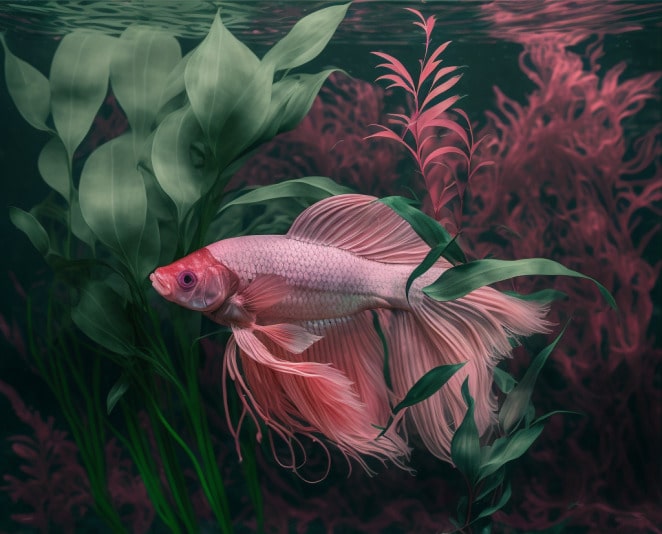
The Best Betta Fish Tank Setup Guide In 2024
The Best Betta Fish Tank Setup Guide In 2024 Find the perfect Betta fish tank
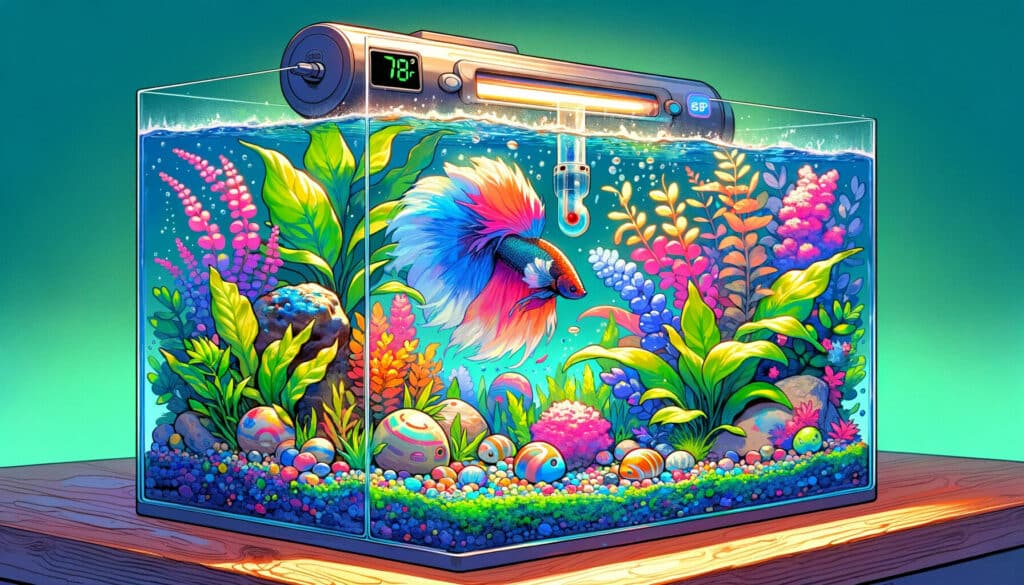
How To Choose The Perfect Aquarium Heater For any Betta Tank
How To Choose The Perfect Aquarium Heater For any Betta Tank Size. Trying To Find
